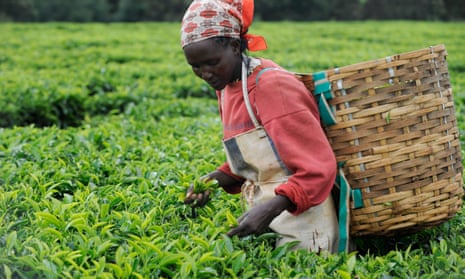John Vidal’s article (“It helped ethical shoppers and 200,000 tea-growers in Africa. Now supermarkets threaten to bring Fairtrade crashing down”, News, 25 June) raises many worrying points. The most concerning is the reaction of African tea-growers’ representatives who met with Sainsbury’s in Nairobi. Their report of a sense of control being exerted on them rather than partnership being fostered is telling.
Fair-minded shoppers worldwide will lose out, too. Fairtrade is a significant global justice movement developed in the final decade of the 20th century, signposting how international trade could be conducted in the 21st century. The Fairtrade movement has strong and growing support in the UK. Progress will be halted and possibly reversed if companies including Sainsbury’s, which is currently the highest volume Fairtrade retailer in the UK, adopt their own trading standards with primary commodity producers worldwide. Farmers and growers will be worse off. So will we all be as fragmentation of standards replaces an internationally recognised, monitored and trusted standard.
Robert Pearce
Wimborne, Dorset
Brexit and questions of identity
Peter Preston’s compelling case for the de facto “European” identity, and its shared historical, cultural and socially resonant credentials by which Britain is broadly defined, is surely a given (Media, 25 June). The fallacious folly of Brexit will bite back with an inevitable fury, and to think that the tiny majority who voted to depart Europe will forever hold the state to ransom, at great cost. Such a momentous decision should at least have had a majority requirement of 65%.
Preston’s commentary could be comfortably applied to the Irish “all-island” question. Why the DUP and its ilk would be so opposed to the natural cohesive entity of one small island, with a shared history and entwined cultural weave, is a perplexing conundrum. The potential mutual benefit, peaceful ambience and progressive maturity allied to the attendant economic, cultural and social boon are pretty predictable.
Jim Cosgrove
Lismore, Co Waterford
Re-examine the language test
As someone who teaches English to foreign nurses I agree that the test is proving counterproductive (“‘Too tough’ language test worsens NHS nurse crisis”, News, 25 June).
Most postgraduate courses at UK universities have lower and/or more flexible entry requirements. Achieving a high score in writing is difficult for nearly all students, regardless of their subject area. For nurses, one might also wonder how appropriate the writing tasks are: a description of a graph and an essay. If students have to retake the test, as many do, there can be considerable movement – up or down – in the scores they achieve for specific language skills, even within a relatively short time frame. All this would suggest that the Nursing and Midwifery Council should attach more importance to the overall score, and be more flexible regarding scores in specific language skills, particularly writing. The nurses I teach enjoy being in the UK and appreciate the high esteem in which the profession is held in this country. They are dedicated and ready to serve.
Ian Lebeau
London N13
Tourism’s double-edged sword
Dan Glaister’s description of the impact of tourism on Porthleven’s fishing community is a timely reminder of a familiar story we must keep telling ourselves (“Picture-postcard perfect – but the English fishing village is not all that it seems”, News, June 25).
In 1988 it was exactly the same prospect of social disarray that led me to form Tourism Concern – except that it was not Cornwall but Goa in India that faced uncontrolled change, as package tourism came to its shores.
In Goa then, as in Porthleven now, the malign effects were mostly unintended. But 30 years on we have less excuse to wring our hands. Thanks to dogged campaigning and years of academic research, planners and community leaders can refer to a weight of evidence about how broken communities and environments are created by unsustainable tourism growth.
Today, it’s possible to be ahead of the game in places being eyed at this very moment as the next “new, authentic” travel destination. But Tourism Concern’s experience is that for everyone to win, we must all want to play our part actively – hosts, guests and intermediaries. Sadly, this remains as elusive a scenario in 2017 as it was in 1988.
Alison Stancliffe
Founder, Tourism Concern
Ryton, Tyne and Wear
Call to arms against article 50
Your editorial (“The folly of May’s hard Brexit is clear. We need consensus on a fresh strategy”, Comment, 25 June) set out clearly what you want a “post-Brexit” UK to look like. To my perhaps undiscerning eye your hoped-for condition looks as near as dammit to “pre-Brexit”. So why aren’t you leading a clarion call for the withdrawal of article 50? We have one foot over the precipice and many of us seem to be looking in vain for at least one voice in the mainstream media to begin a relentless campaign urging the abandonment of this enormous folly. I have given up on the notion that the Labour party might step up to the plate. Please do your bit!
Geoff Jones
Wrexham
Charles encounters rock royalty
So Prince Charles got to meet Suzi Quatro (Magazine, June 25). A brush with greatness indeed!
Francis Blake
London N17
